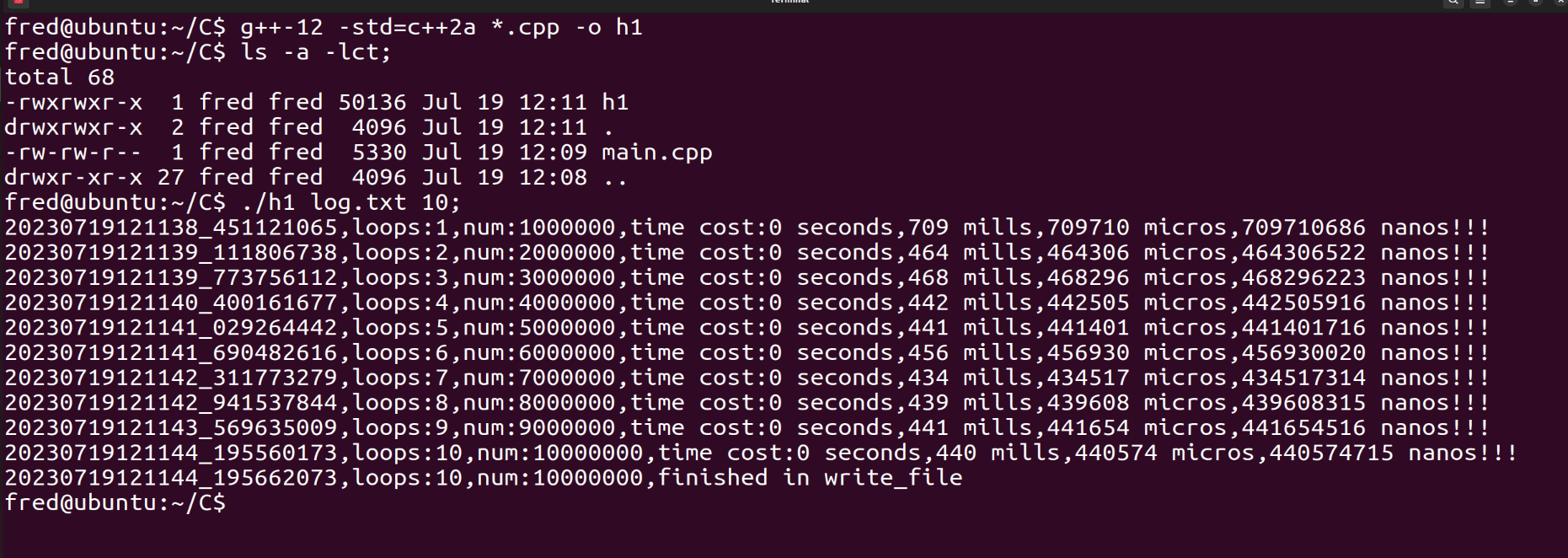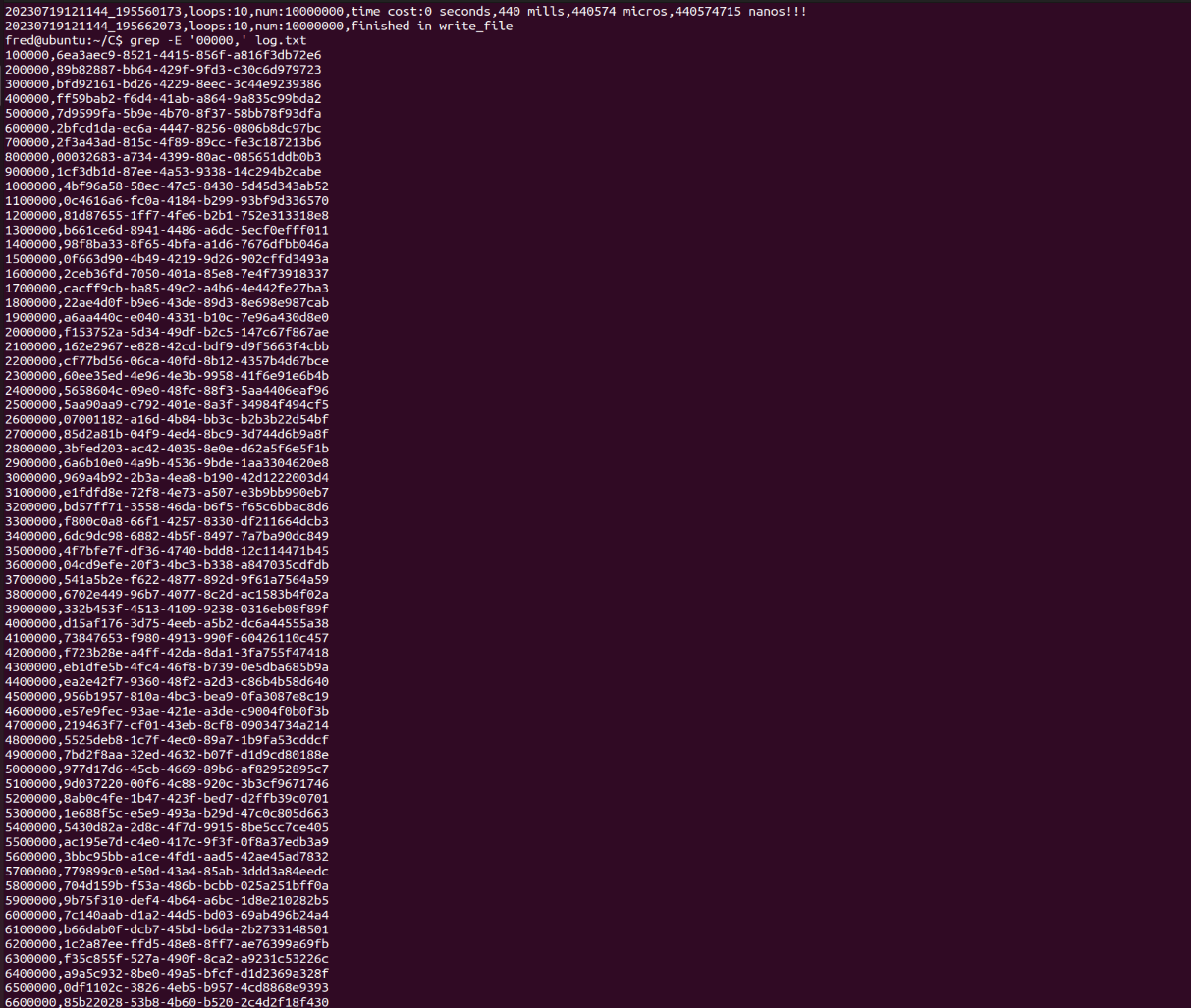cpp generate uuid by random
#include <cstdio>
#include <cstdlib>
#include <ctime>
#include <cstdint>
uint32_t rand32()
{
return ((rand() & 0x3) << 30) | ((rand() & 0x7fff) << 15) | (rand() & 0x7fff);
}
bool gen_uuid4(char dst[37], size_t len)
{
int n = snprintf(dst, len, "%08x-%04x-%04x-%04x-%04x%08x",
rand32(), // Generates a 32-bit Hex number
rand32() & 0xffff, // Generates a 16-bit Hex number
((rand32() & 0x0fff) | 0x4000), // Generates a 16-bit Hex number of the form 4xxx (4 indicates the UUID version)
(rand32() & 0x3fff) + 0x8000, // Generates a 16-bit Hex number in the range [0x8000, 0xbfff]
rand32() & 0xffff, rand32()); // Generates a 48-bit Hex number
return n >= 0 && n < len; // Success only when snprintf result is a positive number and the provided buffer was large enough.
}
int main()
{
char strUuid[37];
srand(time(NULL));
bool success = gen_uuid4(strUuid, sizeof(strUuid));
printf("%s\n", success ? strUuid : "UUID generation failed!");
return 0;
}
#include <algorithm>
#include <chrono>
#include <ctime>
#include <fstream>
#include <iomanip>
#include <iostream>
#include <map>
#include <memory>
#include <mutex>
#include <queue>
#include <random>
#include <set>
#include <sstream>
#include <thread>
#include <typeinfo>
#include <vector>
#include <cstdio>
#include <cstdlib>
#include <ctime>
#include <cstdint>
std::string get_time_now()
{
std::chrono::time_point<std::chrono::high_resolution_clock> now = std::chrono::high_resolution_clock::now();
time_t raw_time = std::chrono::high_resolution_clock::to_time_t(now);
struct tm tm_info = *localtime(&raw_time);
std::stringstream ss;
ss << std::put_time(&tm_info, "%Y%m%d%H%M%S");
auto seconds = std::chrono::duration_cast<std::chrono::seconds>(now.time_since_epoch());
auto mills = std::chrono::duration_cast<std::chrono::milliseconds>(now.time_since_epoch());
auto micros = std::chrono::duration_cast<std::chrono::microseconds>(now.time_since_epoch());
auto nanos = std::chrono::duration_cast<std::chrono::nanoseconds>(now.time_since_epoch());
ss << "_"
<< std::setw(3) << std::setfill('0') << (mills.count() - seconds.count() * 1000)
<< std::setw(3) << std::setfill('0') << (micros.count() - mills.count() * 1000)
<< std::setw(3) << std::setfill('0') << (nanos.count() - micros.count() * 1000);
return ss.str();
}
uint32_t rand32()
{
return ((rand() & 0x3) << 30) | ((rand() & 0x7fff) << 15) | (rand() & 0x7fff);
}
void gen_uuid4(char dst[37], size_t len)
{
snprintf(dst, len, "%08x-%04x-%04x-%04x-%04x%08x",
rand32(), // Generates a 32-bit Hex number
rand32() & 0xffff, // Generates a 16-bit Hex number
((rand32() & 0x0fff) | 0x4000), // Generates a 16-bit Hex number of the form 4xxx (4 indicates the UUID version)
(rand32() & 0x3fff) + 0x8000, // Generates a 16-bit Hex number in the range [0x8000, 0xbfff]
rand32() & 0xffff, rand32()); // Generates a 48-bit Hex number
}
void test_rand_gen_uuid(const int &len)
{
char uuid_value[37];
srand(time(NULL));
for (int i = 0; i < len; i++)
{
gen_uuid4(uuid_value, sizeof(uuid_value));
std::cout << i << "," << uuid_value << std::endl;
}
std::cout << get_time_now() << ",finished in " << __FUNCTION__ << std::endl;
}
void test_time_cost(const int &loops)
{
char uuid_value[37];
srand(time(NULL));
std::chrono::time_point<std::chrono::high_resolution_clock> _start_time, _end_time;
for (int i = 0; i < loops; i++)
{
_start_time = std::chrono::high_resolution_clock::now();
for (int j = 0; j < 1000000; j++)
{
gen_uuid4(uuid_value, sizeof(uuid_value));
}
_end_time = std::chrono::high_resolution_clock::now();
std::cout << "Loops:" << i + 1 << ", time cost:"
<< std::chrono::duration_cast<std::chrono::seconds>(_end_time - _start_time).count() << " seconds,"
<< std::chrono::duration_cast<std::chrono::milliseconds>(_end_time - _start_time).count() << " mills,"
<< std::chrono::duration_cast<std::chrono::microseconds>(_end_time - _start_time).count() << " micros,"
<< std::chrono::duration_cast<std::chrono::nanoseconds>(_end_time - _start_time).count() << " nanos!" << std::endl;
}
}
void write_file(const std::string &file_name, const int &loops)
{
std::ofstream w_file(file_name, std::ofstream::app);
if (!w_file.is_open())
{
std::cout << get_time_now() << ",create or open " << file_name << " failed!" << std::endl;
return;
}
char uuid_value[37];
std::stringstream ss;
srand(time(NULL));
static std::uint64_t num = 0;
std::chrono::time_point<std::chrono::high_resolution_clock> _start_time, _end_time;
for (int i = 0; i < loops; i++)
{
_start_time = std::chrono::high_resolution_clock::now();
for (int j = 0; j < 1000000; j++)
{
gen_uuid4(uuid_value, sizeof(uuid_value));
ss << ++num << "," << uuid_value << std::endl;
}
_end_time = std::chrono::high_resolution_clock::now();
w_file.write(ss.str().c_str(), ss.str().size());
ss = std::stringstream();
if (!w_file.good())
{
std::cout << get_time_now() << ", write failed!loops:" << i + 1 << ",num:" << num << std::endl;
break;
}
std::cout << get_time_now() << ",loops:" << i + 1 << ",num:" << num << ",time cost:"
<< std::chrono::duration_cast<std::chrono::seconds>(_end_time - _start_time).count() << " seconds,"
<< std::chrono::duration_cast<std::chrono::milliseconds>(_end_time - _start_time).count() << " mills,"
<< std::chrono::duration_cast<std::chrono::microseconds>(_end_time - _start_time).count() << " micros,"
<< std::chrono::duration_cast<std::chrono::nanoseconds>(_end_time - _start_time).count() << " nanos!!!" << std::endl;
}
w_file.close();
std::cout << get_time_now() << ",loops:" << loops << ",num:" << num << ",finished in " << __FUNCTION__ << std::endl;
}
int main(int agrs, char **argv)
{
write_file(argv[1],atoi(argv[2]));
return 0;
}
Compile
g++-12 -std=c++2a *.cpp -o h1
.Run
./h1 log.txt 10;

grep -E '00000,' log.txt;




 浙公网安备 33010602011771号
浙公网安备 33010602011771号